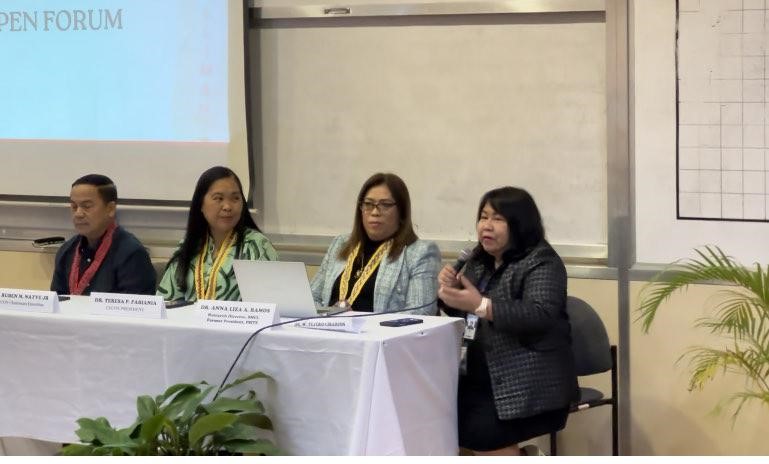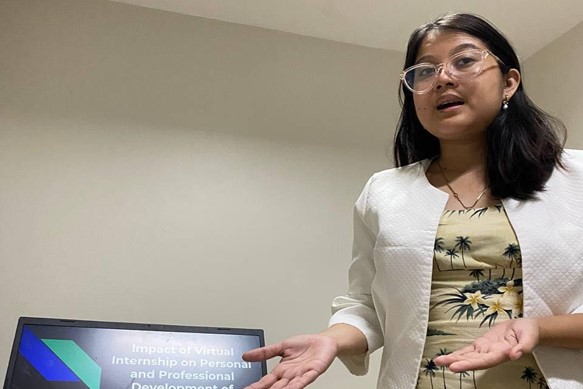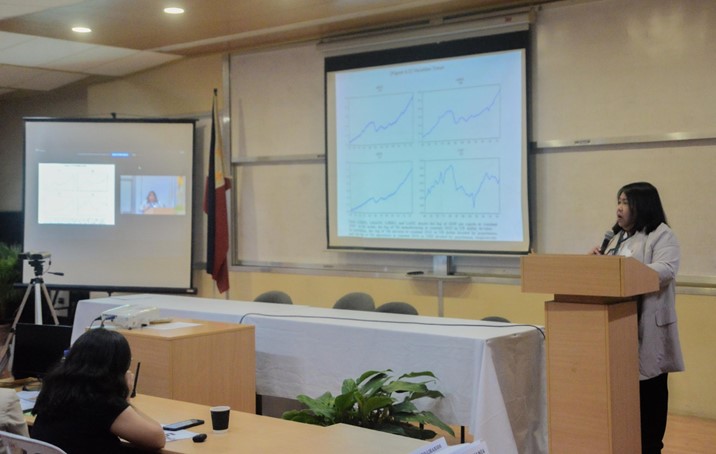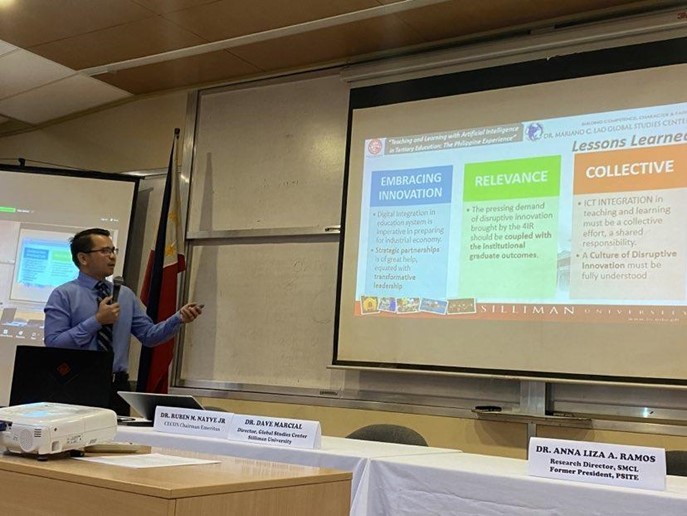
Business student, alumnus, CBA dean present research papers at economics conference

(L-R) Dr. Ruben Nayve, CECON chairman emeritus; Dr. Teresita Fabiana, CECON President; Dr. Ana Liza Ramos, 2022 Philippine Society of Information Technology Educators president; and Dr. Wilma Tejero-Libarios, SU CBA dean .
Novah Jane Dahili, a student at Silliman University (SU) College of Business Administration (CBA); Robygienne Alburo, a CBA alumnus; and Dr. Wilma Tejero-Libarios, CBA dean, each presented their research papers at the Council of Economics Educators’ (CECON) 27th National and 6th International Conference on Economics Education.
SU CBA hosted the conference with the theme, “Economics Education: Status and Future of Artificial Intelligence in Teaching and Learning Among Southeast Asian Nations” on November 23-24, 2023, and had 170 participants who joined online via Zoom and 50 participants onsite.
Tejero-Libarios served as Dahili’s and Alburo’s thesis adviser.
Study on internships
Dahili, a Bachelor of Science in Business Administration (BSBA), Major in Business Economics student, presented a paper titled ‘’Impact of Virtual Internship on the Personal and Professional Development of Students.”
Dahili said that internships are an important part of undergraduate students’ professional and personal development; however, they were halted due to the COVID-19 pandemic between 2020 and 2021, forcing higher education institutions in the Philippines to adjust to a new setup. Despite the lack of evidence of their effectiveness, virtual internships have become one of the most often used setups for conducting internship programs.
The analysis of variance (ANOVA) and the measure of central tendency were used to investigate the influence of virtual internships on the professional and personal growth of SU student-interns. The results suggest that virtual internships have a positive impact on senior students’ professional and personal growth. However, the vast majority of virtual interns recommend onsite internships.
The findings of the paper revealed a statistical difference between the modes of internship adopted. Interns under onsite internship program are more satisfied than virtual interns, said Dahili.
Study on vaccinated, unvaccinated’s well-being
Meanwhile, Alburo, a BSBA Major in Business Economics graduate, presented a paper titled “The Well-Being of the Vaccinated and Unvaccinated Residents of Negros Oriented Philippines.”
Participated by 303 local residents of Negros Oriental, Alburo and her co-researchers utilized both descriptive and quantitative analyses. Specifically, in determining the level of wellbeing of the respondents particularly on the physical, mental, emotional, social, spiritual, and economic aspects, the Likert Scale was used. To determine whether there was a significant difference between the well-being of the vaccinated and unvaccinated, the Mann-Whitney U test was used.
Their findings revealed that there is a significant difference between the well-being of the two independent groups, which were the vaccinated and the unvaccinated local residents of Negros Oriental.
Study on manufacturing
Tejero’s research paper, titled “Link Between Manufacturing and Other Sectors of Philippine Economy: A Vector Autoregressive Approach,” examined the link between manufacturing and the service and agricultural sectors of the Philippines, as well as the country’s Gross Domestic Product (GDP) per capita.
The researchers observed that manufacturing and services sectors have a bidirectional relationship. Tejero and her co-author, Dr. Jinyoung Hwang, utilized cointegration and Granger causality approach under vector autoregressive framework using annual data from 1965 to 2019.
They also found that an increase in GDP does not precede growth in agriculture, implying that the country’s economic growth does not trickle down to the primary sector (agriculture). Among the three sectors, manufacturing creates the longest responses from the services and agricultural sectors.
The authors said that the government should take action that would assist the acceleration of the Philippine manufacturing sector’s competitiveness through policies that stimulate better infrastructure, technological innovation and development, and more ambitious R&D initiatives.
‘’The rise of the country’s manufacturing sector increases agricultural diversification and consumer demand for higher-value services,’’ Tejero said.
A total of 12 research papers from 12 universities were presented during the conference.
Keynote speakers during the two-day conference include Dr. Rafaelita Aldaba, the undersecretary of the Department of Trade and Industry; Dr. Jose Mark Libre, Commission on Higher Education commissioner; and Dr. Agham Cuevas, president of Philippine Economics Society and University of the Philippines Los Baños vice chancellor for academic affairs.
Dr. Dave Marcial, SU Dr. Mariano Lao Global Studies Center director, was invited to speak on artificial intelligence on the second day of the event.

Novah Jane Dahili presents a paper titled “Impact of Virtual Internship on the Personal and Professional Development of Students.”

Alburo presents a paper titled, “The Well-Being of Vaccinated and Unvaccinated Local Residents of Negros Oriental, Philippines.”

Dr. Tejero-Libarios presents a paper titled “Link Between Manufacturing and other Sectors of Philippine Economy: A Vector Autoregressive Approach.”

Dr. Dave Marcial, director of SU-Lao Global Studies Center, in his talk about artificial intelligence during the 27th CECON National Conference as one of the resource speakers.


